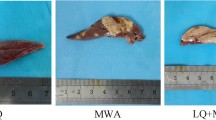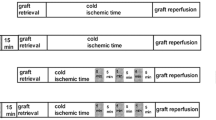Abstract
Ischemia-reperfusion (I/R) is a major mechanism of liver injury following hepatic surgery or transplantation. Despite numerous reports on the role and relics of low-intensity laser therapy (LILT) in many organs, the potential effects of LILT on hepatic ischemia-reperfusion have not been explored. This study was aimed to investigate the impresses of LILT applied to the skin following hepatic ischemia and reperfusion. Thirty-six healthy male Wistar rats were allocated into three groups of twelve animals each as follows: Sham, Ischemia-reperfusion (IR), and Ischemia-reperfusion with laser treatment (IR+LILT). Hepatic ischemia was induced by clamping the arterial and portal venous for 45 min. A laser diode (400 mW, 804 nm) was applied to the skin surface at the anatomical site of the liver at a dose of 3 J/cm2, and the duration of irradiation was selected 120 s with 15-min interval after beginning the reperfusion. Animals were maintained under anesthesia and sacrificed 6 h subsequent reperfusion. Hepatic samples were evaluated for histological assessment and biochemistry analysis. Serum aminotransferase levels, tumor necrosis factor-alpha (TNF-α) levels, malondialdehyde (MDA), and glutathione (GSH) levels were significantly lower (P < 0.05) in the irradiated group compared to the I/R group during the 6 h after reperfusion. The number of histopathological changes in the hepatic tissues was significantly lower in the treated group (P < 0.05). These observations suggest that LILT applied in transcutaneous manner effectively improves hepatic injuries after ischemia-reperfusion period in rats.








Similar content being viewed by others
References
Chouker A, Schachtner T, Schauer R, Dugas M, Lohe F, Martignoni A, Pollwein B, Niklas M, Rau HG, Jauch KW, Peter K, Thiel M (2004) Effects of Pringle manoeuvre and ischaemic preconditioning on haemodynamic stability in patients undergoing elective hepatectomy: a randomized trial. Br J Anaesth 93:204–211
Banga NR, Homer-Vanniasinkam S, Graham A, Al-Mukhtar A, White SA, Prasad KR (2005) Ischaemic preconditioning intransplantation andmajor resectionof the liver. Br J Surg 92:528–538
Vollmar B, Glasz J, Leiderer R et al (1994) Hepatic microcirculatory perfusion failure is a determinant for liver dysfunction in warmischemia-reperfusion. Am J Pathol 145:1421
Kang KJ (2002) Mechanism of hepatic ischemia/reperfusion injury and protection against reperfusion injury. Transplant Proc 34:2659
Selzner N, Rudiger H, Graf R et al (2003) Protective strategies against ischemic injury of the liver. Gastroenterology 125:917
Takhtfooladi MA, Sharifi D, Mokmeli S, Abedi G, Mortazavi P, Haghdoust IS, Fattahian H, Asghari A (2012) Morphometric analysis of low level laser therapy (780 nm) in transected sciatic nerve regeneration after end to end neurorrhaphy in rabbit. Res Opin Anim Vet Sci 2(8):480–484
Takhtfooladi MA, Sharifi D, Sohrabi Haghdost I, Abedi G (2012) Effects of laser therapy (680 nm) on recovery of the sciatic nerve in rabbits. Adv Environ Biol 6(12):4057–4061
Abergel RP, Lyons RF, Castel JC, Dwyer RM, Uitto J (1987) Biostimulation of wound healing by laser: experimental approaches in animal models and in fibroblast cultures. Dermatol Surg Oncol 13:127–133
Loginov AS, Sokolova GN, Smotrova IA, Potapova VB, Markin EP, Ambartsumian RV (1991) Effect of laser irradiation of different intensities on the processes of healing of stomach ulcer. Soviet Med 2:9–11
Ivaniuta OM, Dziublik AI, Skopichenko VN (1992) Optimal effectiveness of complex treatment of patients with chronic obstructive bronchitis by intravascular laser irradiation of blood. Probl Tuberk 6:21–24
Vasil’ev AP, Strel’tsova NN, Shakhov GG, Nikitina VI (1992) The effect of laser irradiation of the blood on the adenosine triphosphatase activity of the erythrocyte membranes and on the cardiac activity indices in patients with ischemic heart disease. Vrach Delo 6:61–64
Yu W, Naim JO, Lanzafame RJ (1994) The effect of laser irradiation on the release of bFGF from 3T3 fibroblasts. Photochem Photobiol 59:167–170
Gourgouliatos ZF, Welch AJ, Diller KR, Aggarwal SJ (1990) Laser-irradiation-induced relaxation of blood vessels in vivo. Lasers Surg Med 10:524–532
Morimoto Y, Arai T, Kikuchi M, Nakajima S, Nakamura H (1994) Effect of low-intensity argon laser irradiation on mitochondrial respiration. Lasers Surg Med 15:191–199
Yu W, Naim JO, Lanzafame RJ (1995) The effect of photo-irradiation (laser) on lymphocyte proliferation and ATP production in vitro. FASEB J 9(3 Pt I):A239
Pacholewicz JK, Ianuzzo CD, Bokhua MR, Ianuzzo SE, Daloisio C, McGrath LB (1994) A novel method for myocardial infarction modification utilizing a helium-neon laser. Lasers Surg Med Suppl 6:65
Salansky N, Brill G, Filonenko N (1994) Blood indexes changes under low energy photon (LEP) irradiation in vivo experiments. Lasers Surg Med Suppl 6:9
Chi LH, Yu W, Naim JO, Lanzafame RJ (1995) Increased synthesis of nitric oxide by laser irradiation in sepsis. Lasers Surg Med Supp 7:19
Buege JA, Aust SD (1978) Microsomal lipid peroxidation. Methods Enzymol 52:302–310
Tietze F (1969) Enzymic method for quantitative determination of nanogram amounts of total and oxidized glutathione: applications to mammalian blood and other tissues. Anal Biochem 27:502–522
Griffith OW (1980) Determination of glutathione and glutathione disulfide usingglutathione reductase and 2-vinylpyridine. Anal Biochem 106:207–212
Frei A, Zimmermann A, Weigand K (1984) The N-terminal propeptide of collagen typeIII in serum reflects activity and degree of fibrosis in patients with chronic liver disease. Hepatology 4:830–834
Sehirli O, Ozel Y, Dulundu E, Topaloglu U, Ercan F, Sener G (2008) Grape seed extract treatment reduces hepatic ischemia-reperfusion injury in rats. Phytother Res 22(1):43–48
Arab HA, Sasani F, Rafiee MH, Fatemi A, Javaheri A (2009) Histological and biochemical alterations in early-stage lobar ischemia-reperfusion in rat liver. World J Gastroenterol 15(16):1951–1957
Kharbanda RK, Peters M, Walton B, Kattenhorn M, Mullen M, Klein N et al (2001) Ischemic preconditioning prevents endothelial injury and systemic neutrophil activation during ischemia-reperfusion in humans in vivo. Circulation 103(12):1624–1630
Moon KH, Hood BL, Mukhopadhyay P, Rajesh M (2008) Oxidative inactivation of key mitochondrial proteins leads to dysfunction and injury in hepatic ischemia reperfusion. Gastroenterology 135:1344–1357
Yu W, McGowan M, Ippolito K, Lanzafame RJ (1997) Photomodulation of oxidative metabolism and electron chain enzymes in rat liver mitochondria. Photochem Photobiol 66:866–871
Ross SD, Kron IL, Gangemi JJ, Shockey KS, Stoler M, Kern JA, Tribble CG, Laubach VE (2000) Attenuation of lung reperfusion injury after transplantation using an inhibitor of nuclear factor-kappaB. Am J Physiol Lung Cell Mol Physiol 279:528–536
De Lima FM, Villaverde AB, Albertini R (2011) Dual effect of low-level laser therapy (LLLT) on the acute lung inflammation induced by intestinal ischemia and reperfusion: action on anti- and pro-inflammatory cytokines. Lasers Surg Med 43:410–420
Author information
Authors and Affiliations
Corresponding author
Rights and permissions
About this article
Cite this article
Takhtfooladi, M.A., Takhtfooladi, H.A. & Khansari, M. The effects of low-intensity laser therapy on hepatic ischemia-reperfusion injury in a rat model. Lasers Med Sci 29, 1887–1893 (2014). https://doi.org/10.1007/s10103-014-1603-7
Received:
Accepted:
Published:
Issue Date:
DOI: https://doi.org/10.1007/s10103-014-1603-7




